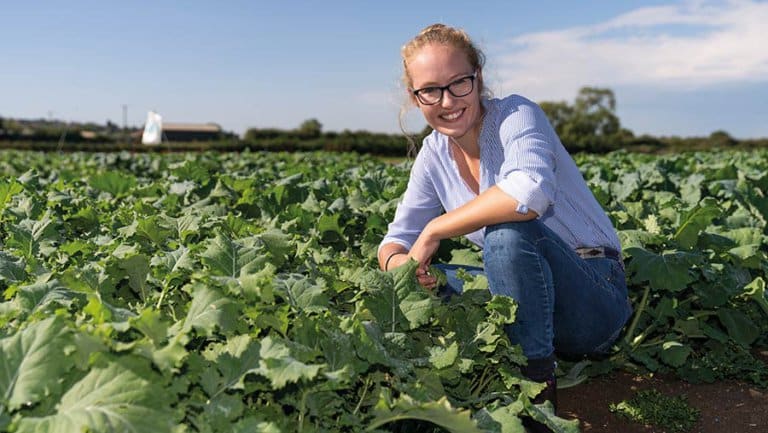
Agriculture is the greatest and fundamentally the most important of our industries. The United Nations predicts that by 2050, the world population could reach 9.7 billion, increasing the number of people who will need access to food, water and other resources. Food demand is expected to increase by 59% to 98% by 2050. In 2023, over 345 million people are facing severe food insecurity, more than double the figure recorded in 2020.
At the same time, rising global temperatures are altering growing seasons and hurting traditional crops, among others. Rains come earlier, while droughts and freezes are unexpected — causing big changes in everyday food items, from rice to apples and chickpeas. The meat industry is facing major upheavals and growing scrutiny over how they create several times more emissions per gram of protein than plant-based proteins like soy or beans.
These prospects highlight the crucial demand for skilled agriculture professionals. Their roles are pivotal in sustaining human life and advancing big goals like ending extreme poverty and enhancing shared prosperity. Pursuing a degree and a career in this field can lead to a meaningful impact and make a difference in the world.
If this aligns with your vision for the future, here are four universities renowned for nurturing graduates who have made a significant impact in the world:
Harper Adams University
Helping create a more sustainable future today, especially with the effects of climate change, takes a lot of work and isn’t easy. Harper Adams University however, is up for the task.
Since it was founded in 1901, Harper Adams has enjoyed a reputation of excellence in agriculturally-focused teaching, working beside the UK’s rural sector to add meaning and relevance to its research and teaching activities. Guiding more than 4,000 students through distinguished undergraduate, postgraduate, research degrees and professional courses, Harper Adams helps every student recognise their own unique ambitions and apply the tools needed to succeed.
Here, students learn “in the field” on its 494-hectare University Farm that harbours dairy, sheep, pig, poultry and a rich scattering of crops. Since this site encompasses the university’s central campus, students are able to investigate the entire food chain, straight from farm to fork.
All BSc students must complete an industrial placement as part of their four-year programme, bringing invaluable real-world experience into their future workplaces – as a result, 99.2% of graduates are in employment within 15 months of graduation, the highest in the UK.
Winning the “Career Prospects” category at the WhatUni Student Choice Awards for seven consecutive years further underscores the effectiveness of their practical degree programmes in empowering students to make an immediate impact. This success is in line with the university’s mission of “Together we will make the difference,” as it not only equips students for their future careers but also nurtures their abilities to address global challenges, particularly in sustainability and the environment.
There’s more — 60% of research conducted at Harper Adams are either world leading or internationally excellent, a fact that Vice-Chancellor, Professor Ken Sloan is proud of. “Harper Adams, with its Future Farm, technology platforms, and strong industry partnerships, offers a distinctive real-world setting for translatable research. This fosters collaboration with and benefits the UK and international agri-food sector while nurturing graduate skills and talent essential for these industries,” he says. Click here to learn more about Harper Adams University and its programmes.
UIUC College of ACES
The College of Agricultural, Consumer and Environmental Sciences (ACES) at the University of Illinois Urbana-Champaign (UIUC) trains students to solve climate change, food security, sustainability and more.
“I love almost every aspect that my major has to offer: dedicated and helpful advisors, world-renowned faculty (who offer a wide range of research opportunities), and supportive classmates,” said Stuart Seputro, who studied crop sciences (concentration in plant biotechnology).
The College of ACES is considered one of the top agricultural schools worldwide with a 91% freshman retention and 75% four-year graduation rate, according to US News and World Report. Beyond agriculture, the college offers academic programmes and research opportunities that span environmental sciences, animal sciences, engineering, agribusiness, finance, economics, law, nutritional science, and communications.
No matter your area of interest, an education here arms you with a wide arsenal to combat real issues and change the world. “You won’t regret choosing the College of ACES,” Seputro said. “ACES has strong alumni connections that can help prepare you for your post-graduation plan.”
By defying disciplinary boundaries, teaching and research here aim to improve global prosperity and help people live happy, healthy lives. Chengxu (Gary) Liu is double majoring in crop sciences (concentration in agroecology) and natural resources and environmental sciences (concentration in fish, wildlife, and conservation biology) to integrate environmental remediation into the agroecosystem. “I am determined to study the environment, wildlife, and conservation to make our planet a better place to dwell,” said Liu.
Liu plans to attend graduate school to research environmental engineering and later to become an environmental engineer or specialist to help the planet and society cope with contemporary environmental and agroecological issues. To discover how the College of ACES can make your vision a reality, click here.
University of Queensland
The University of Queensland ranks fourth globally and first in Australia for agriculture in the latest NTU Performance Ranking of Scientific Papers. Its School of Agriculture and Food Sustainability is renowned for its interdisciplinary work in agriculture, agribusiness, food science and technology, plant and soil sciences, and animal and wildlife science — ranking 13th worldwide and first in Australia for food science and technology in ShanghaiRanking’s 2022 Global Ranking of Academic Subjects.
The school focuses on three main impact areas. For dairy science and engineering, the school partners with Dairy Innovation Australia Limited on a five-year ARC Industrial Transformation Research Hub, providing solutions to the dairy manufacturing industry. For food science researcher training, students and postdoctoral fellows participate in industry-relevant research projects at the ARC Industrial Transformation Training Centre. This collaboration involves working with the Australian Food and Grocery Council and food companies, covering science, engineering, sensory, consumer perception studies, and agribusiness.
The third area of impact focuses on food quality. Projects include identifying and quantifying traits that define superior fragrant rice, applying nanotechnology to minimise changes in milk protein powders during storage, and using genomics to enhance the cheese-making process.
Students pursuing food science and technology at the school benefit from access to its world-leading specialist research centres and facilities, including the QAAFI Centre for Nutrition and Food Sciences and the UQ Food Science Innovation Precinct. They can choose from many degree options such as Bachelor of Science with a major in Food Science and Nutrition, Bachelor of Science (Honours) specialising in Food Science and Nutrition, Graduate Certificate in Food Science and Technology, and Master of Food Science and Technology.
*Some of the institutions featured in this article are commercial partners of Study International







